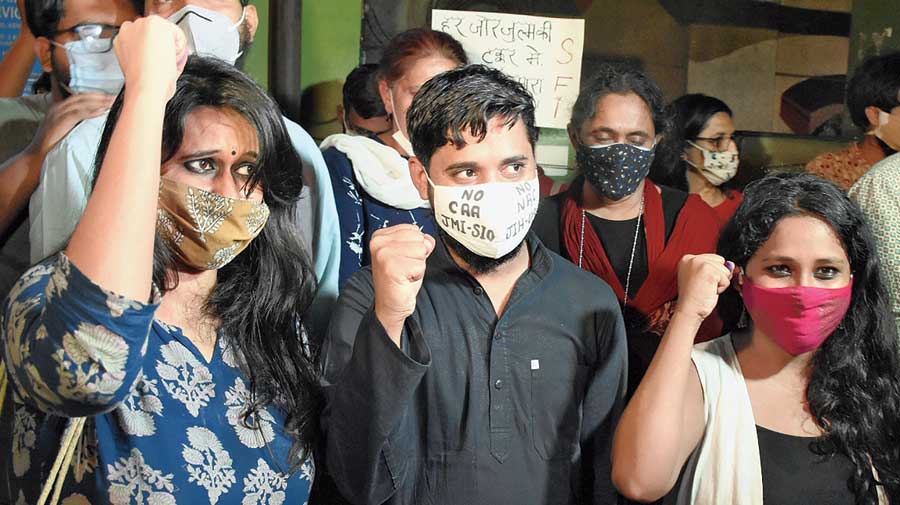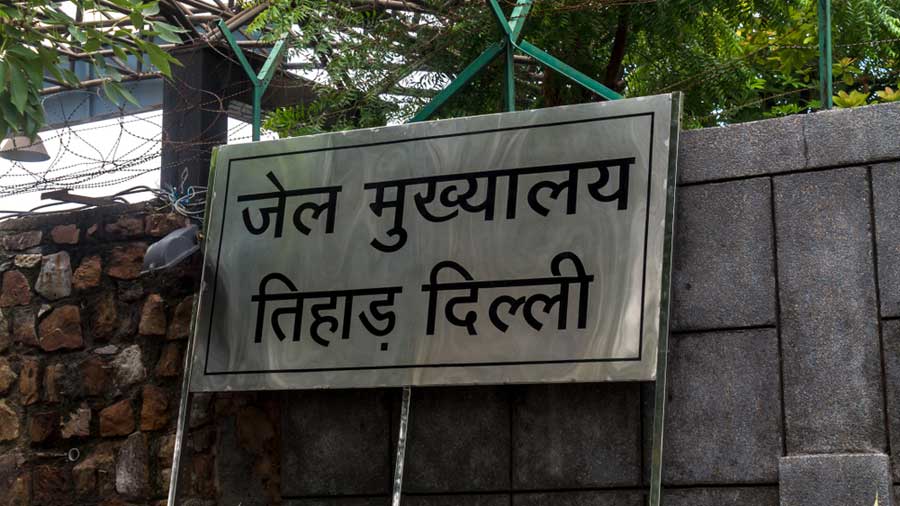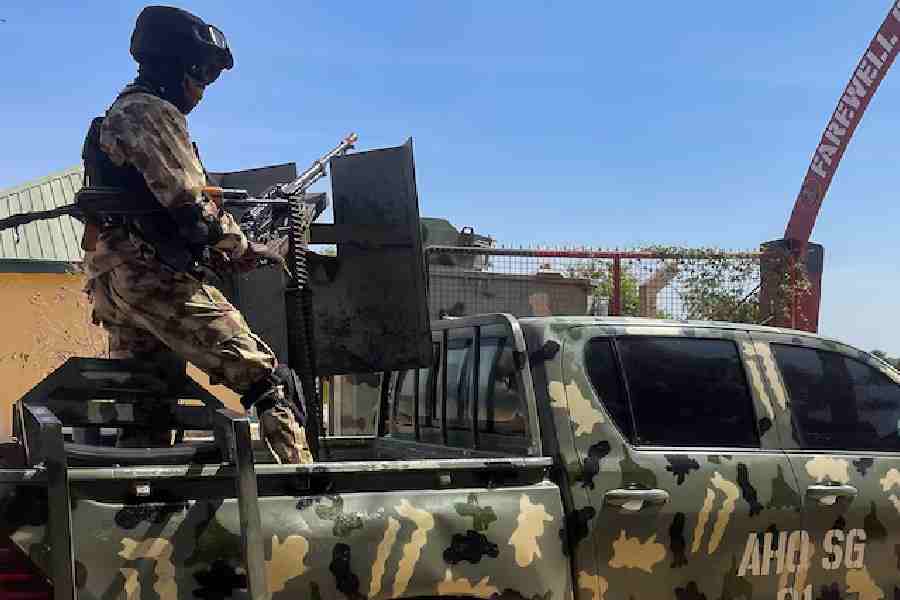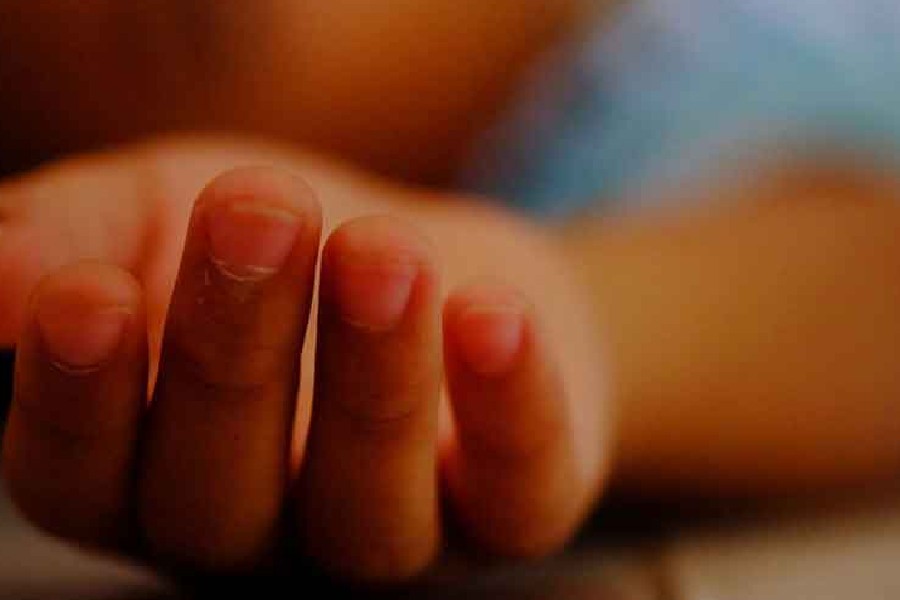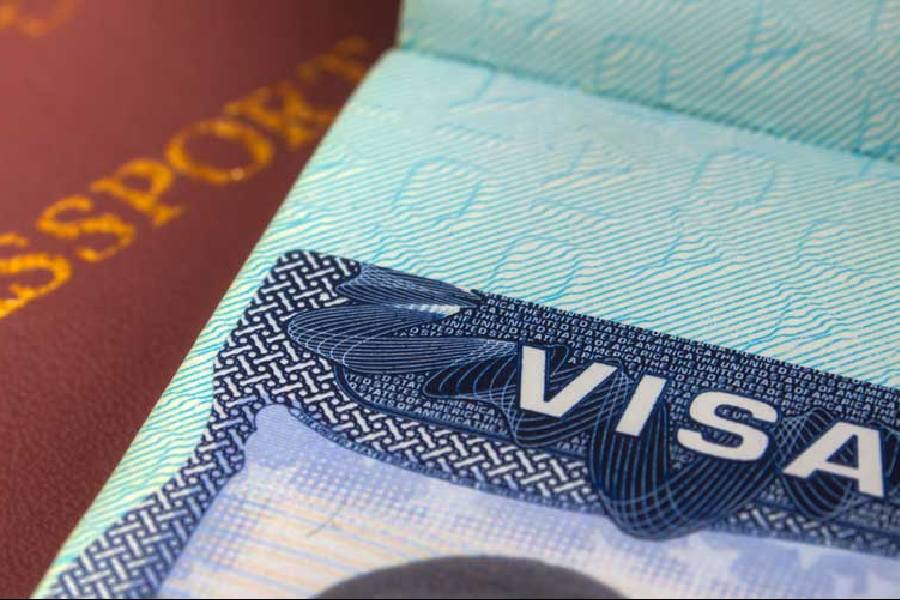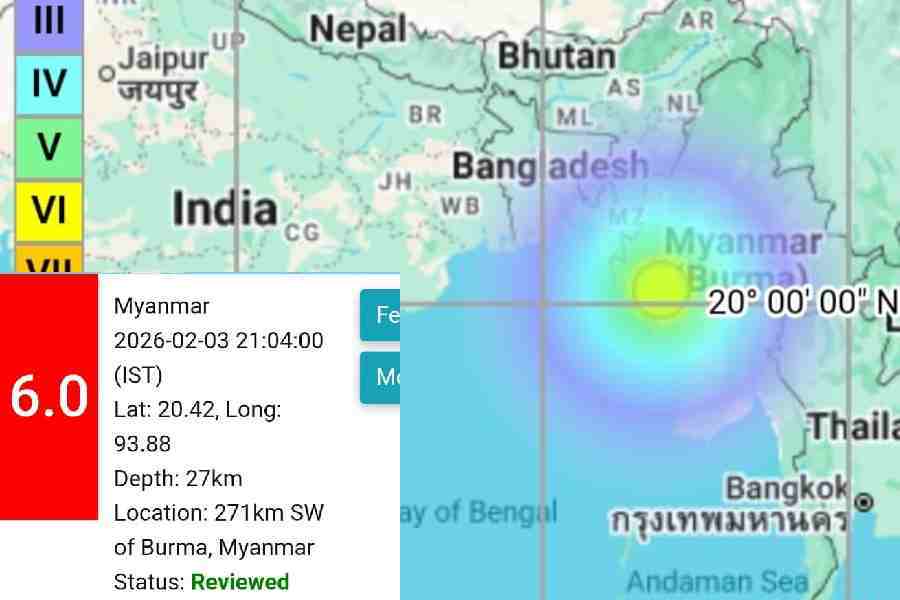Three student anti-CAA protesters whose release on bail had been stalled over technicalities were set free on Thursday evening after a court, on the prodding of Delhi High Court, said that address verification could not be a plausible reason for continued imprisonment.
Jawaharlal Nehru University students Natasha Narwal, 32, and Devangana Kalita, who turns 32 on Friday, and Jamia Millia Islamia student Asif Iqbal Tanha, 25 — in jail since April last year and booked under a host of charges, including the anti-terror law UAPA — walked free around 7.30pm.
Natasha and Devangana were released from Tihar jail. Asif, who had been on interim custody bail at a south Delhi hotel, was taken back to Tihar and released with the others. He had been at the hotel for over a week after the court permitted him to write his BA Persian final semester exams.
Natasha’s brother Aakash said in a statement: “I wish our father was here to share this moment with us today. We owe it to him; as Natasha, myself and all justice-loving people had a strong moral backing from him all these months.”
Their father Mahavir Narwal had passed away on May 11 while Natasha was in jail.
The Supreme Court is scheduled to hear on Friday appeals from Delhi police challenging the Delhi High Court order granting bail to the three student activists.
The Supreme Court vacation bench of Justices Hemant Gupta and V. Ramasubramanian will hear the three separate appeals filed by the police who have said the high court’s findings were “perverse and contrary to record” and appeared to be based “more on the social media narrative”.
The high court had said it seemed the State was blurring the line between the right to protest and terrorist activity in its “anxiety to suppress dissent”.
On Thursday, Delhi High Court had advised the trial court of Shahdara district additional sessions judge Ravinder Bedi to deal with the bail applications before it with “promptitude” and “expedition”.
“Trial court cannot be lax about it once the order is passed by this court,” the high court added.
The three students had moved the high court, which granted them bail on June 15 after the trial court had withheld their bail.
The trial court, which was supposed to satisfy itself that the bail conditions were implementable, had asked the police on Wednesday to verify the bail bonds and the details of the people standing surety for the accused.
The police had then told the court that they needed time till June 22 to complete the verification of the permanent addresses of the students.
CPM leader Brinda Karat had told this newspaper earlier: “This is a most shameful effort by the Delhi police special cell, which comes directly under the home ministry, to sabotage and subvert the significant judgment of the high court….”
Natasha is from Rohtak in Haryana, Devangana is from Dibrugarh in Assam while Asif is from Hazaribagh, Jharkhand. The police had also sought to verify their Aadhaar numbers from the Unique Identity Authority of India. The trial court had granted the police time till June 23 to verify the outstation addresses.
On Thursday morning, the Delhi High Court division bench of Justices Siddharth Mridul and Anup Bhambhani, while hearing the pleas of the three students against the trial court, refused to intervene but said: “The learned special court is expected to proceed with the pending issues with promptitude and expedition; and pronounce orders on the issues pending determination before it forthwith.”
The high court said that its earlier directive mandated forthwith release of the accused.
Minutes later, trial court judge Bedi told the defence during a hearing that she had already passed the orders at 11am. Her order asked the police to finish verifying the current Delhi addresses of the three students by 5pm on Thursday, after the defence gave an undertaking that they would not leave Delhi.
The court said: “Apropos the reason forwarded by the IO (investigating officer) that verification qua accused’s permanent address would need time. I would say that this by itself cannot be a plausible reason for the accused to be kept imprisoned till the time such reports are filed.”
A legal source said: “The court staff verified the bail bonds, sureties, spellings of names and so on. The release warrant was finally sent to Tihar prison after 5pm.”
Another source said Karat remained in court till the evening to ensure there was no last-minute hitch. Karat has stood surety for Natasha, whose father was a CPM member.
When Delhi High Court was informed that the trial court had ordered the “immediate release” of the students, it said, “That’s wonderful.”
The high court bench of Justices Mridul and Bhambhani said: “Once the trial court has issued release orders to the jail superintendent, that is the end of the matter. Nothing more needs to be done. The first step we need to cross today is your release.”
The high court had on June 15 granted bail to Pinjra Tod activists Natasha, Devangana and Asif, who had been arrested in connection with the alleged larger conspiracy behind the Delhi riots in February last year that followed the protests against the Centre’s new citizenship regime.
Natasha and Devangana were on Thursday evening greeted by several students outside Tihar jail. The students carried placards demanding the release of all undertrials in cases related to the protests against the CAA.
Charges have been framed against 15 people, including six students, in the UAPA case. Besides the trio released on Thursday, only Jamia’s Safoora Zargar is out on regular bail, granted on medical grounds of pregnancy.
Asif said in a statement: “At this time, I would specifically like to appeal to the government to address the Covid condition in prison. Prisoners with shorter sentences need to be released to end overcrowding and all prisoners must immediately be vaccinated.
“I want to reiterate that our fight is against the discriminatory CAA and not against people of any faith. I’m glad that the honourable court has asserted that our peaceful and democratic protests had nothing to do with the riots. I hope that this judgement will serve as an important precedent.”
Devangana told reporters: “It is really important the court has come out and could say this (that organising protests is not a terrorist act) because people like us are languishing in jail just for protesting against this government or raising their voice against this government — which is the basic essence of democracy.”
Natasha thanked those who had supported her in prison.
On Wednesday, UN special rapporteur on human rights defenders Mary Lawlor had tweeted: “I’m hearing disturbing reports that… Natasha Narwal and Devangana Kalita have not been released after @DelhiPolice challenged yesterday’s Delhi High Court decision to grant them bail. I find their incarceration following #antiCAA protests in #India deeply concerning.”

